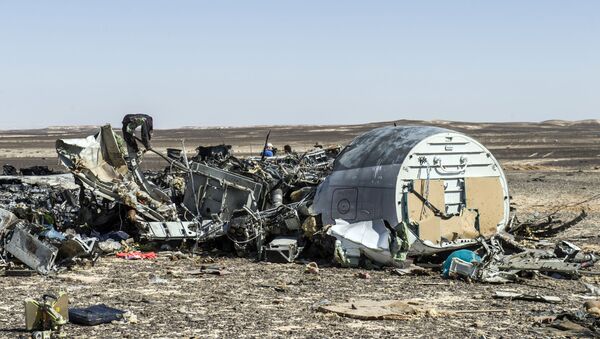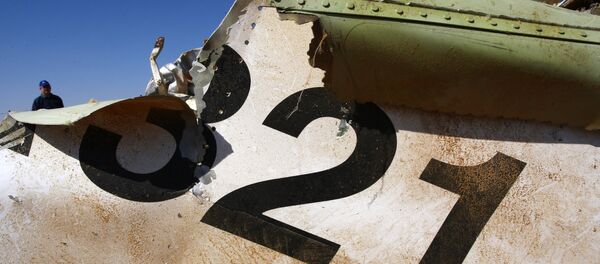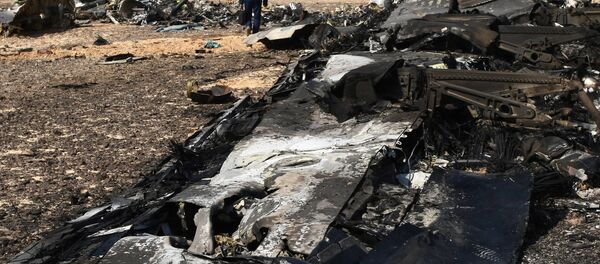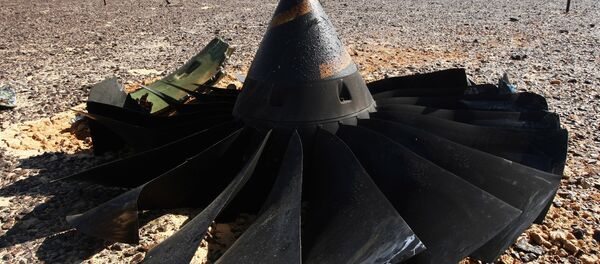Alexander Smirnov, the deputy director of the airline Kogalymavia that was operating the ill-fated A321 passenger plane, excluded human and technical factors as causes of the crash. The top manager with the Russian air carrier Kogalymavia said on Monday that the company could not rule out a terrorist attack as a possible reason behind Saturday's flight 7K9268 crash in Egypt.
However, Russia’s aviation watchdog, Rosaviatsia, said it was premature to come to any conclusions about the cause of the crash and called for patience among the aviation community.
Oleg Smirnov, the chairman of Russia's Federal Transport Agency's commission on civil aviation, advised against "spread[ing] aerophobia" and recommended waiting for results of the investigation before drawing any conclusions.
"A variety of unsubstantiated versions have been set out, including by the media, on the basis of TV images. However, the analysis should be carried out only on the basis of established facts," Smirnov told RIA Novosti.
He added that the only thing that is clear at the moment is that the airliner disintegrated in mid-air, as evidenced by the large area over which the plane debris and bodies were dispersed.
Hans Weber, the president of a San Diego-based aviation consulting firm TECOP International Ltd., also thinks that it is premature for experts and the media to be setting out various scenarios to explain the crash.
"In my opinion, the problem with venturing a theory as to what caused the catastrophic accident is that the information that we know does not consistently fit any obvious accident scenario," he told Sputnik.
"There wouldn’t have been any altitude and speed changes in the case of a sudden catastrophic decompression. What caused the altitude and speed changes? Perhaps failure of the rear bulkhead severe enough to damage aircraft controls (e.g. hydraulic circuits), but not enough to break the aircraft apart. When the aircraft went into a stall and tumbled down it may have broken apart," expert explained.
Julian Bray, an aviation and security expert, said that a wide range of reasons might have led to the crash, but none of the reasons being aired at the moment could be exclusively relied upon.
"It could have been sabotage, it could be technical, it could be pilot suicide, which I doubt, so there is nothing we can say at the moment that actually stands up," Bray told Sputnik.
Bray added that reports that the Islamic State (IS) jihadist group was responsible for the crash are not realistic, because the altitude of the flight — 31,000 feet — put the plane beyond the reach of militants.
He did not exclude the explanation that "something" might have been planted on board which could have exploded later.
Gerry Soejatman, an independent aviation expert, says it is still too early to rule out technical failure as a cause of the tragedy.
"Just because the aircraft passed all the necessary tests, and was in good technical condition, it does not mean that there was no technical problem during the flight," he said.
According to Soejatmen, every aircraft has to be airworthy prior to each flight, and yet, from time to time, technical malfunctions still occur.
"What is unusual is that if this was a technical problem, the aircraft crashed, so something beyond what was reasonably anticipated had occurred. I suspect Kogalymavia is struggling to explain that technical problems can still occur on a perfectly healthy plane," he pointed out.
Mark Rosenker, a former US National Transportation Safety Board (NTSB) member, believes that downloading and analyzing the cockpit voice and flight data recorders would provide greater insight into the causes of the plane crash, that at the moment could be attributed to a wide range of causes.
"It could have been a catastrophic decompression. It could have structural failures… This airplane a number of years ago had a tail strike," Rosenker told Sputnik when asked to assess whether external impact was the only plausible scenario for the plane breaking up in mid-air.
Despite floating various theories on the cause of the crash, the experts all agree that only an official probe into the accident can shed light on its causes.
Preparation of a report based on the flight data recorders recovered from the crashed Russian Kogalymavia A321 will take from between one and four weeks, spokesman for the Egyptian government Hossam Kawish said Tuesday.
The tragedy has become the largest civilian aircraft disaster in Russian and Soviet history.






